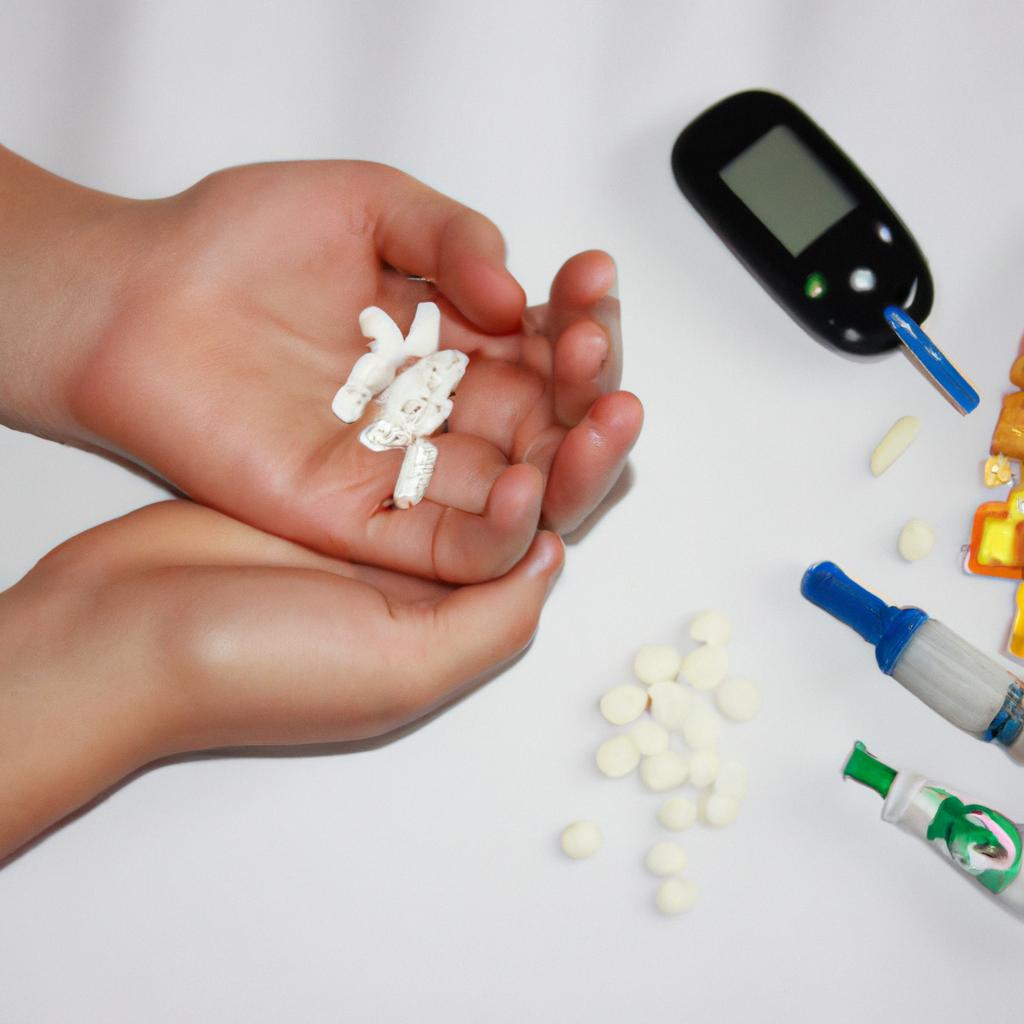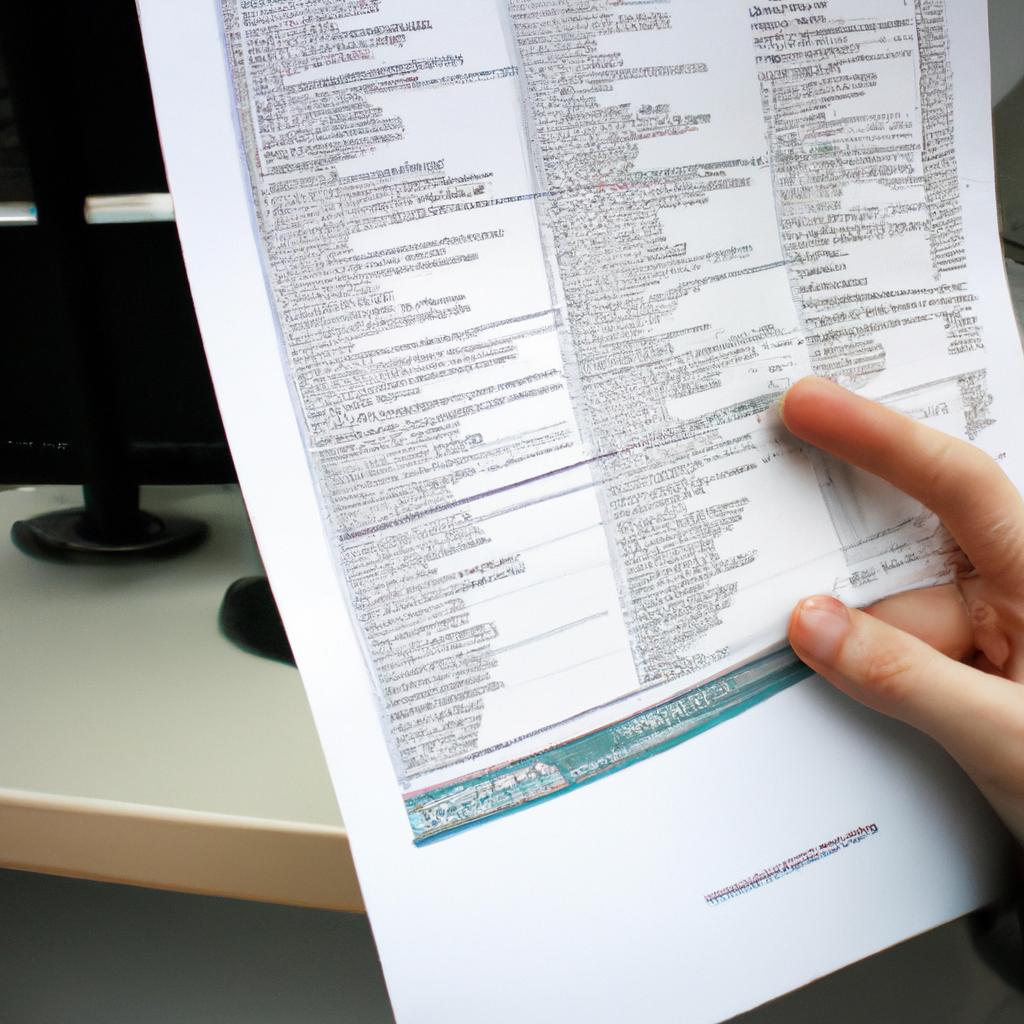Diabetes is a chronic disease that affects millions of people worldwide, posing significant challenges to their overall health and well-being. Effective management of diabetes requires individuals to adopt various strategies and make necessary lifestyle changes to keep their blood sugar levels within the target range. For instance, consider the case of John, a 45-year-old man diagnosed with type 2 diabetes. By implementing effective management techniques and adopting appropriate lifestyle modifications, John successfully controlled his blood glucose levels and experienced improved quality of life.
To effectively manage diabetes, individuals must prioritize regular monitoring of their blood sugar levels through self-monitoring or continuous glucose monitoring systems. This allows for timely adjustments in medication dosage or insulin administration as needed. In addition, dietary modifications play a crucial role in maintaining stable blood sugar levels. A balanced diet rich in whole grains, fruits, vegetables, lean proteins, and healthy fats can help regulate glucose metabolism while promoting optimal nutrition intake. Furthermore, engaging in regular physical activity aids in managing blood sugar levels by increasing insulin sensitivity and facilitating weight loss. Incorporating aerobic exercises such as brisk walking or cycling along with strength training activities helps improve glycemic control and reduce cardiovascular risks associated with diabetes.
By following these tips and strategies for effective diabetes management, individuals like John can achieve better control over their blood sugar levels and reduce the risk of complications associated with diabetes. John’s dedication to monitoring his blood glucose levels regularly allowed him to make necessary adjustments in his medication dosage or insulin administration, ensuring that his blood sugar remained within the target range. Additionally, he adopted a balanced diet consisting of whole grains, fruits, vegetables, lean proteins, and healthy fats. This helped regulate his glucose metabolism and provided him with optimal nutrition intake.
Engaging in regular physical activity was another key aspect of John’s diabetes management plan. By incorporating aerobic exercises like brisk walking or cycling into his routine, he increased his insulin sensitivity and facilitated weight loss. He also included strength training activities to further improve glycemic control and reduce cardiovascular risks associated with diabetes.
Through consistent implementation of these strategies, John successfully controlled his blood glucose levels and experienced an improved quality of life. It is important for individuals with diabetes to consult their healthcare team for personalized advice on managing their condition effectively.
Understanding blood sugar levels
Understanding Blood Sugar Levels
One example that illustrates the importance of understanding blood sugar levels is the case of Sarah, a 45-year-old woman diagnosed with type 2 diabetes. Sarah had been struggling to manage her condition effectively until she learned about the impact of blood sugar levels on her overall health. By closely monitoring and maintaining optimal blood sugar levels, she was able to better control her symptoms and improve her quality of life.
To effectively manage diabetes, it is crucial to understand how blood sugar levels fluctuate throughout the day. These fluctuations are influenced by various factors such as food intake, physical activity, stress, medications, and sleep patterns. Monitoring these levels regularly can provide valuable insights into one’s overall glucose control and help identify potential triggers or patterns that may require adjustments in treatment plans.
Elevated blood sugar levels have adverse effects on both short-term and long-term health outcomes for individuals with diabetes. In the short term, high blood sugar can lead to symptoms like increased thirst, frequent urination, fatigue, blurred vision, and slow wound healing. Over time, consistently elevated blood sugar levels can contribute to serious complications such as cardiovascular disease, kidney damage, nerve damage (neuropathy), eye problems (retinopathy), and lower limb amputations.
To emphasize the significance of managing blood sugar levels effectively:
- High blood sugar: Increased risk of immediate discomforts and potential complications
- Low blood sugar: Risk of hypoglycemia leading to dizziness, confusion or unconsciousness
- Fluctuating blood sugar: Emotional rollercoaster affecting mood and mental well-being
- Stable blood sugar: Enhanced energy levels and improved overall sense of well-being
Additionally, here is an emotional bullet point list highlighting key strategies for effective diabetes management:
- Regular self-monitoring of blood glucose using a glucometer
- Following a balanced diet consisting of whole grains, lean proteins,
fruits & vegetables while limiting processed foods and added sugars - Taking prescribed medications as instructed by healthcare professionals
- Engaging in regular physical activity, tailored to individual capabilities
Furthermore, the following table provides a visual representation of blood sugar ranges and their corresponding effects:
| Blood Sugar Level | Effect |
|---|---|
| Below 70 mg/dL | Hypoglycemia |
| 70 – 130 mg/dL | Ideal range |
| Above 180 mg/dL | Hyperglycemia (high) |
| Over 250 mg/dL | Immediate medical attention required |
Understanding and managing blood sugar levels effectively is crucial for individuals with diabetes. By implementing proper monitoring techniques, adopting healthy lifestyle habits, and adhering to treatment plans, one can achieve better glucose control and minimize the risk of complications associated with this condition.
Importance of regular exercise
Case Study:
Imagine a person named John, who has recently been diagnosed with diabetes. He wants to effectively manage his condition but is unsure where to start. One crucial aspect of diabetes management is understanding blood sugar levels, which play a significant role in maintaining overall health.
Factors Affecting Blood Sugar Levels:
To effectively manage blood sugar levels, it is essential to consider various factors that can impact them. These factors include:
- Diet: The foods we consume directly affect our blood sugar levels. Foods high in carbohydrates tend to raise blood sugar more quickly than protein-rich or low-carbohydrate options.
- Physical Activity: Engaging in regular exercise helps regulate blood sugar levels by increasing insulin sensitivity and improving glucose uptake by muscles.
- Medications: Certain medications, such as insulin or oral hypoglycemic agents prescribed by healthcare professionals, can help control blood sugar levels.
- Stress Levels: Stress hormones released during periods of stress can cause an increase in blood sugar levels. Managing stress through techniques like meditation or relaxation exercises may be beneficial for individuals with diabetes.
Emotional Impact:
Understanding the importance of managing blood sugar levels goes beyond physical health; it also affects emotional well-being. Here is how effective diabetes management contributes to emotional stability:
| Emotional Benefits | Physical Benefits | Lifestyle Enhancements |
|---|---|---|
| Reduced anxiety | Lower risk of complications | Improved quality of life |
| Enhanced self-confidence | Increased energy levels | Improved sleep patterns |
| Better mood | Weight management | Greater sense of control |
By actively managing their blood sugar levels, individuals with diabetes can experience these positive changes and live a healthier, happier life.
Transition Sentence into Subsequent Section:
Understanding the significance of regulating blood sugar levels paves the way for adopting healthy eating habits for effective diabetes management. Let’s explore the next section on incorporating nutritious food choices into your daily routine.
Healthy eating habits for diabetes management
Transitioning from the importance of regular exercise, it is crucial to also focus on developing healthy eating habits for effective diabetes management. For instance, consider the case study of Sarah, a middle-aged woman diagnosed with type 2 diabetes. By making dietary changes and incorporating specific strategies into her lifestyle, she successfully managed her blood sugar levels and improved her overall well-being.
Outlined below are key tips and strategies that can aid in maintaining stable blood glucose levels:
- Portion control: Keeping track of portion sizes plays a significant role in managing diabetes effectively. Opt for smaller plates or bowls to help regulate food intake.
- Choose nutrient-dense foods: Prioritize consuming foods that provide essential nutrients while avoiding excessive calories. Incorporate vegetables, whole grains, lean proteins, and healthy fats into your meals.
- Limit refined sugars and carbohydrates: Minimizing the consumption of sugary beverages, processed snacks, and desserts can help stabilize blood sugar levels. Instead, opt for natural sources of sweetness like fruits or sweeten foods using alternatives such as stevia or monk fruit extract.
- Mindful eating practices: Engaging in mindful eating techniques can enhance one’s relationship with food. Take time to savor each bite, chew slowly, and listen to your body’s hunger cues.
To further illustrate these strategies visually, refer to the following table:
| Strategies | Benefits | Implementation |
|---|---|---|
| Portion control | Regulates food intake | Use smaller plates or bowls |
| Nutrient-dense foods | Provides essential nutrients | Include vegetables, whole grains, lean proteins |
| Limit refined sugars/carbs | Stabilizes blood sugar | Avoid sugary drinks/snacks; choose natural alternatives |
| Mindful eating practices | Enhanced food experience | Chew slowly & pay attention to hunger/fullness cues |
By incorporating these strategies into your daily routine, you can significantly improve diabetes management and overall health. Remember that effective diabetes management encompasses various aspects beyond exercise and diet, including monitoring and tracking your progress.
Now, let’s explore the importance of monitoring and tracking your progress in achieving optimal diabetes control.
Monitoring and tracking your progress
Building on the foundation of healthy eating habits, effective diabetes management also requires consistent monitoring and tracking of one’s progress. By keeping a close eye on blood sugar levels, medication usage, physical activity, and other relevant factors, individuals with diabetes can make informed decisions to optimize their health.
Case study: Take Sarah as an example. She was diagnosed with type 2 diabetes two years ago and has been diligently following her doctor’s advice regarding diet and exercise. However, she often found herself struggling to maintain stable blood sugar levels despite her efforts. It wasn’t until she started actively monitoring her progress that she discovered specific patterns in her glucose readings related to certain meals or activities.
To effectively monitor and track your progress in managing diabetes, consider implementing the following strategies:
- Blood Sugar Log: Keep a detailed record of your daily blood sugar readings using a logbook or smartphone app. Note down the date, time, pre- and post-meal values, medications taken, and any symptoms experienced.
- Medication Tracker: Create a separate tracker to ensure you take your prescribed medications consistently at the right times. This will help avoid missed doses or accidental double-dosing.
- Physical Activity Diary: Maintain a diary or use fitness apps to document your exercise routines and their impact on your blood sugar levels. This will enable you to identify which activities are most beneficial for maintaining optimal glucose control.
- Lifestyle Observations: Pay attention to how lifestyle factors such as stress levels, sleep quality, alcohol consumption, or illness affect your blood sugar management. Making note of these observations can assist you in making necessary adjustments when needed.
| Strategy | Benefit | Emotional Response |
|---|---|---|
| Blood Sugar Log | Identifying patterns & triggers | Empowerment |
| Medication Tracker | Ensuring consistency in treatment | Confidence |
| Physical Activity | Determining the impact of exercise on blood sugar levels | Motivation |
| Lifestyle Observations | Identifying factors that affect glucose control | Control |
By consistently monitoring and tracking your progress, you gain valuable insights into how different aspects of your lifestyle influence diabetes management. This newfound knowledge empowers you to make necessary adjustments in diet, medication, or physical activity to achieve better blood sugar control.
As stress can significantly impact diabetes management, incorporating effective stress management techniques is essential for overall well-being. Let’s explore some strategies to help cope with the daily challenges and reduce stress levels while managing diabetes.
Stress management techniques
stress management. The relationship between stress and diabetes has been well-documented, with research indicating that high-stress levels can negatively impact blood glucose control. To effectively manage diabetes, implementing stress management techniques becomes essential.
Paragraph 1:
To illustrate the significance of stress management in diabetes care, let’s consider a hypothetical case study. Meet Sarah, a 45-year-old woman diagnosed with type 2 diabetes five years ago. Despite adhering to her medication regimen and diet plan, Sarah noticed persistent fluctuations in her blood sugar levels. After consulting her healthcare team, they determined that chronic stress might be contributing to these irregularities. This realization prompted Sarah to explore various stress management strategies tailored specifically for individuals living with diabetes.
Paragraph 2:
When it comes to managing stress as part of your overall diabetes care routine, there are several effective techniques you can incorporate into your daily life:
- Engage in regular physical activity such as walking or yoga.
- Practice relaxation exercises like deep breathing or meditation.
- Seek support from family, friends, or support groups.
- Incorporate hobbies or activities that bring joy and help alleviate stress.
Table – Strategies for Stress Management:
| Techniques | Description |
|---|---|
| Regular Physical Activity | Engaging in moderate exercise has been shown to reduce stress levels |
| Relaxation Exercises | Deep breathing exercises and meditation promote relaxation and decrease anxiety |
| Seeking Support | Receiving emotional support from loved ones or joining support groups can provide relief during stressful times |
| Pursuing Hobbies | Having enjoyable activities helps divert attention from stressors |
Paragraph 3:
By incorporating these stress management techniques into your daily routine, you can significantly improve your overall well-being while effectively managing your diabetes. Remember, stress is a common part of life, but finding healthy ways to cope with it can positively impact your health outcomes.
In addition to implementing these stress management techniques in your daily routine, collaborating closely with your healthcare team will further enhance your ability to manage diabetes effectively.
Collaborating with healthcare professionals
Having discussed stress management techniques, it is crucial for individuals with diabetes to also focus on collaborating effectively with healthcare professionals. By establishing a strong partnership with their healthcare team, individuals can enhance their understanding of the condition, receive appropriate guidance, and ensure optimal diabetes management.
Collaborating with healthcare professionals plays a vital role in effective diabetes management. For instance, consider the case study of Sarah, a 35-year-old diagnosed with type 2 diabetes. Through regular communication and collaboration with her doctor, dietician, and diabetic educator, Sarah was able to develop a personalized treatment plan that included medication adjustments, dietary modifications, exercise recommendations, and self-monitoring strategies. This collaborative approach empowered Sarah to take control of her health and achieve significant improvements in managing her blood glucose levels.
To facilitate effective collaboration between individuals with diabetes and their healthcare professionals, here are some key strategies:
- Establish open lines of communication: Maintain regular contact with your healthcare team through scheduled appointments or virtual consultations. Be proactive in sharing any concerns or questions related to your diabetes management.
- Actively participate in decision-making: Engage in discussions regarding treatment options and actively contribute to decisions about medication regimens, lifestyle changes, and goal-setting.
- Keep track of medications and tests: Maintain an accurate record of all prescribed medications along with relevant test results such as blood sugar readings or A1C levels. Share this information during medical consultations for better assessment.
- Seek support beyond medical visits: Utilize additional resources like online forums or local support groups where you can connect with others facing similar challenges. These networks provide valuable emotional support and practical tips for managing everyday life with diabetes.
- The fear of complications resulting from uncontrolled blood sugar levels can be overwhelming.
- The constant need for monitoring and managing diabetes can lead to feelings of frustration or burnout.
- Balancing various aspects of life, such as work, family, and self-care, can create additional stressors.
- Diabetes management requires discipline and commitment, which can sometimes feel isolating.
Emotional response-evoking table:
| Emotional Impact | Coping Strategies | Support Resources |
|---|---|---|
| Anxiety | Deep breathing exercises | Online meditation apps |
| Frustration | Engaging in hobbies | Local support groups |
| Isolation | Seeking social connections | Diabetes-related podcasts |
In summary, collaborating effectively with healthcare professionals is essential for individuals with diabetes to receive the necessary guidance and support. By actively participating in decision-making, maintaining open communication channels, and utilizing available resources beyond medical visits, individuals can take significant strides toward effective diabetes management. Remember that while managing diabetes may present emotional challenges, there are coping strategies and support systems available to help navigate this journey successfully.
 Web Firma
Web Firma



